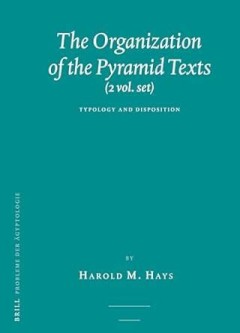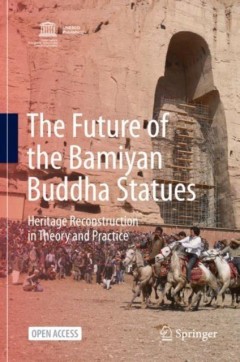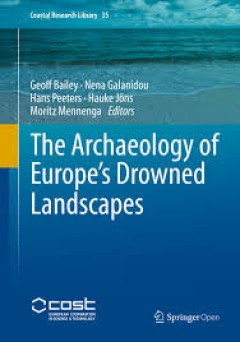Filter by

The Saqqara Necropolis through the New Kingdom = Biography of an Ancient Egyp…
This book is the first comprehensive monographic treatment of the New Kingdom (1539–1078 BCE) necropolis at Saqqara, the burial ground of the ancient Egyptian city of Memphis, and addresses questions fundamental to understanding the site’s development through time. For example, why were certain areas of the necropolis selected for burial in certain time periods; what were the tombs’ spati…
- Edition
- -
- ISBN/ISSN
- 9789004467149
- Collation
- 560 hlm; ill., lamp.,
- Series Title
- Culture and History of the Ancient Near East, Volume: 131
- Call Number
- -

The Phoebe A. Hearst Expedition to Naga ed-Deir, Cemeteries N 2000 and N 2500
The Phoebe A. Hearst Expedition to Naga ed-Deir, Cemeteries N 2000 and N 2500 presents the results of excavations directed by George A. Reisner and led by Arthur C. Mace. The site of Naga ed-Deir, Egypt, is unusual for its continued use over a long period of time (c. 3500 BCE–650 CE). Burials in N 2000 and N 2500 date to the First Intermediate Period/Middle Kingdom and the Coptic era. In keep…
- Edition
- -
- ISBN/ISSN
- 978900439690
- Collation
- 544 hlm; ill., lamp.,
- Series Title
- Harvard Egyptological Studies, Volume: 10
- Call Number
- -

The Organization of the Pyramid Texts (2 vols.) = Typology and Disposition
The ancient Egyptian Pyramid Texts form the oldest sizable body of religious texts in the world. Discovered in the late nineteenth century, they had been inscribed on the interior stone walls of the pyramid tombs of third-millennium kings and queens. From their content it is clear that they were concerned with the afterlife state of the tomb owner, but the historical meaning of their emergence …
- Edition
- -
- ISBN/ISSN
- 9789004227491
- Collation
- 348 hlm; ill., lamp.,
- Series Title
- Probleme der Ägyptologie, Volume: 31
- Call Number
- -

The Future of the Bamiyan Buddha Statues = Heritage Reconstruction in Theory …
This Open Access book explores heritage conservation ethics of post conflict and provides an important historical record of the possible reconstruction of the Bamiyan Buddha statues, which was inscribed in the UNESCO World Heritage List in Danger in 2003 as “Cultural Landscape and Archaeological Remains of the Bamiyan Valley”. With the condition that most surface of the original fragments o…
- Edition
- 1
- ISBN/ISSN
- 9783030513160
- Collation
- XXV, 364 hlm; ill., lamp.,
- Series Title
- -
- Call Number
- -

Threats to Our Ocean Heritage: Potentially Polluting Wrecks
This open access volume focuses on the environmental hazards and cultural significance of Potentially Polluting Wrecks (PPWs), and how mitigation efforts have assisted in documenting and preserving the history of these sites. It is an important resource on the subject of Potentially Polluting Wrecks that synthesizes previously published information that was not academically or scientifically pr…
- Edition
- -
- ISBN/ISSN
- 978-3-031-57960-8
- Collation
- XII, 159
- Series Title
- SpringerBriefs in Archaeology (BRIEFSARCHAE)
- Call Number
- -

Threats to Our Ocean Heritage: Bottom Trawling
This open access book focuses on the destruction of our Ocean Heritage from bottom trawling. It brings together the natural and cultural sides of the marine environment to further our understanding of the importance of this heritage, how it is threatened by activities such as bottom trawling, and provides recommendations, such as a moratorium in particularly vulnerable areas that are currently …
- Edition
- -
- ISBN/ISSN
- 978-3-031-57953-0
- Collation
- XVII, 109
- Series Title
- SpringerBriefs in Archaeology (BRIEFSARCHAE)
- Call Number
- -

The Indigenous Identity of the South Saami : Historical and Political Perspec…
This open access book is a novel contribution in two ways: It is a multi-disciplinary examination of the indigenous South Saami people in Fennoscandia, a social and cultural group that often is overlooked as it is a minority within the Saami minority. Based on both historical material such as archaeological evidence, 20th century newspapers, and postcard motives as well as current sources such …
- Edition
- 1
- ISBN/ISSN
- 9783030050290
- Collation
- XI, 186 hlm,: ill, lamp;
- Series Title
- -
- Call Number
- -

World Archaeo-Geophysics : Integrated minimally invasive approaches using cou…
This open access volume showcases the intersection of geophysics and archaeology on a global scale, emphasising the evolution and application of geophysical methods in archaeological research and cultural heritage management. It compiles contributions from 74 experts based in 18 countries, with their research and case studies spanning across 24 different countries, focusing on the use of near-s…
- Edition
- -
- ISBN/ISSN
- 978-3-031-57900-4
- Collation
- XXVIII, 482
- Series Title
- One World Archaeology (WORLDARCH)
- Call Number
- 900 WOR

The Archaeology of Europe’s Drowned Landscapes
This open access volume provides for the first time a comprehensive description and scientific evaluation of underwater archaeological finds referring to human occupation of the continental shelf around the coastlines of Europe and the Mediterranean when sea levels were lower than present. These are the largest body of underwater finds worldwide, amounting to over 2500 find spots, ranging from …
- Edition
- -
- ISBN/ISSN
- 978-3-030-37367-2
- Collation
- XXVIII, 561
- Series Title
- Coastal Research Library (COASTALRL, volume 35)
- Call Number
- 900 ARC

The Prehistoric Maritime Frontier of Southeast China : Indigenous Bai Yue and…
This open access book presents multidisciplinary research on the cultural history, ethnic connectivity, and oceanic transportation of the ancient Indigenous Bai Yue (百越) in the prehistoric maritime region of southeast China and southeast Asia. In this maritime Frontier of China, historical documents demonstrate the development of the “barbarian” Bai Yue and Island Yi (岛夷) and their …
- Edition
- 1
- ISBN/ISSN
- 9789811640797
- Collation
- XXIII, 264 hlm,: ill, lamp;
- Series Title
- 4
- Call Number
- -
 Computer Science, Information & General Works
Computer Science, Information & General Works  Philosophy & Psychology
Philosophy & Psychology  Religion
Religion  Social Sciences
Social Sciences  Language
Language  Pure Science
Pure Science  Applied Sciences
Applied Sciences  Art & Recreation
Art & Recreation  Literature
Literature  History & Geography
History & Geography